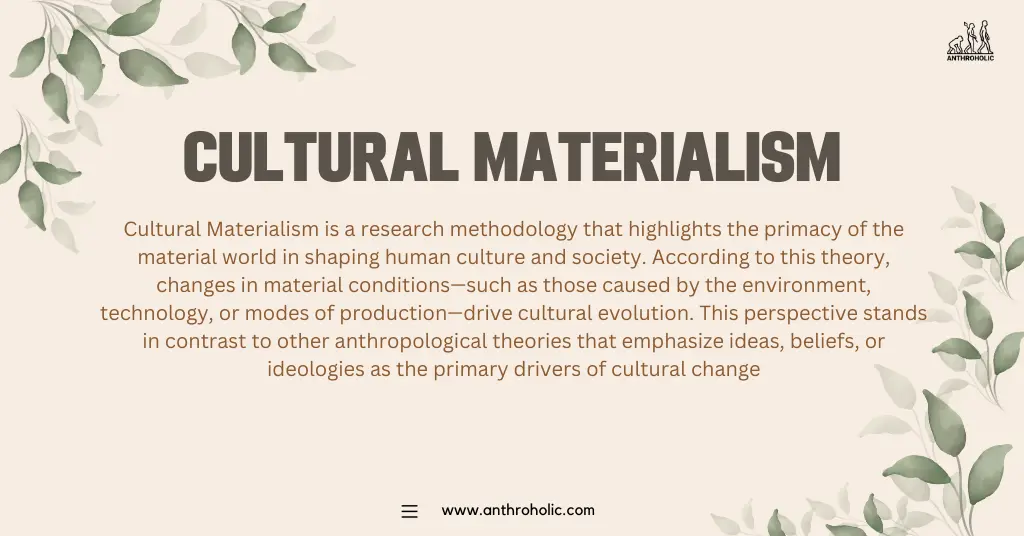AI Answer Evaluation Platform Live Now. Try Free Answer Evaluation Now
Cultural Materialism
Cultural Materialism, a theoretical framework originally coined by anthropologist Marvin Harris, provides an insightful perspective for examining socio-cultural phenomena. As a research strategy, it uses the material conditions of life, specifically the production and reproduction of life, to illuminate cultural practices and beliefs [1].

Overview of Cultural Materialism
Cultural Materialism is a research methodology that highlights the primacy of the material world in shaping human culture and society. According to this theory, changes in material conditions—such as those caused by the environment, technology, or modes of production—drive cultural evolution. This perspective stands in contrast to other anthropological theories that emphasize ideas, beliefs, or ideologies as the primary drivers of cultural change [2].
Key Tenets of Cultural Materialism
Cultural Materialism comprises several core principles:
- Materialism: The material conditions of a society, including the natural environment and the means of production, are primary in shaping the society’s cultural practices and beliefs.
- Historical Particularism: Each culture is unique due to its specific history, which is shaped by its material conditions.
- Cultural Evolution: Societies evolve due to changes in material conditions rather than the diffusion of ideas or cultural borrowing.
- Scientific Methodology: The study of cultures should be empirical, using observable data and testable hypotheses [3].
The Infrastructure-Superstructure Model
Central to Cultural Materialism is the infrastructure-superstructure model. This model asserts that society’s infrastructure, or the material aspects of life like technology and economics, shapes its superstructure, which includes the more symbolic aspects of culture such as religion, politics, and ideology.
| Infrastructure | Superstructure | |
|---|---|---|
| Components | Technology, Modes of production and reproduction | Social structures, Politics, Religion, Ideologies |
| Role in Society | Shapes society’s physical and economic aspects | Reflects and legitimizes the infrastructure |
The relationship between infrastructure and superstructure is bidirectional but asymmetric. Although changes in superstructure can influence the infrastructure, Cultural Materialists believe that the primary direction of influence is from infrastructure to superstructure [4].
Cultural Materialism in Practice
Marvin Harris used Cultural Materialism to explain a wide range of cultural phenomena. For example, he argued that the Hindu taboo against cow slaughter in India is due to practical reasons such as the cow’s utility for milk and labor. By using a Cultural Materialist approach, Harris linked the religious practice to the material conditions of Indian society [5].
This approach can be used to study contemporary phenomena as well. It might help explain, for instance, how environmental conditions and economic inequalities contribute to political instability and cultural change in various parts of the world.
Critiques of Cultural Materialism
While Cultural Materialism provides a robust theoretical framework, it has faced several criticisms. Critics argue that it overly simplifies culture by reducing it to material conditions and neglects the role of human agency. They also suggest that it assumes all cultural practices are functional and beneficial, overlooking the possibilities of cultural maladaptation or irrational behavior [6].
Cultural Materialism vs. Other Theoretical Frameworks
Cultural Materialism stands in contrast to other theoretical frameworks in anthropology and sociology, such as symbolic and interpretive anthropology, and postmodernist theories.
- Symbolic and Interpretive Anthropology: This perspective, associated with scholars like Clifford Geertz, focuses on the symbolic meanings that people attribute to their experiences. While Cultural Materialism suggests that material conditions determine cultural practices, symbolic anthropology argues that these practices are primarily shaped by symbolic and interpretive processes [7].
- Postmodernist Theories: Postmodernist theorists challenge the objective analysis of cultures, suggesting that multiple interpretations and narratives exist. They argue that Cultural Materialism’s emphasis on scientific methodology overlooks the complexity and diversity of human experiences [8].
The Relevance of Cultural Materialism Today
Despite the challenges and criticism it has faced, Cultural Materialism remains relevant in contemporary anthropology and sociology. Its materialistic approach enables us to understand how societal infrastructure can significantly influence cultural superstructure, especially in the era of rapid technological advancements and environmental changes.
Moreover, its emphasis on empirical, testable hypotheses also resonates with the increasing trend towards evidence-based social sciences, helping to establish a more systematic and scientific approach to the understanding of culture.
Future Directions of Cultural Materialism
The future of Cultural Materialism is likely to involve greater engagement with other theoretical perspectives and a more nuanced understanding of the relationship between material conditions and cultural phenomena. Future research may consider:
- Integrating more focus on human agency: Recognizing individuals’ capacity to shape and be shaped by material conditions.
- Exploring cultural maladaptations and irrational behaviors: Not all cultural practices may be rational or beneficial responses to material conditions.
- Increasing interdisciplinary engagement: Collaborating with fields like archaeology, economics, and environmental sciences can offer deeper insights into the material conditions shaping culture [9].
Conclusion
Cultural Materialism, with its empirical and materialist orientation, has provided valuable insights into the dynamic interplay between material conditions and cultural phenomena. Despite criticisms, it continues to remain relevant and promises to evolve in line with contemporary socio-cultural realities. Its future directions signal a more nuanced and interdisciplinary approach towards understanding culture, thus retaining its crucial role in anthropological and sociological research.
Suggested Reading
| Classical Evoutionism | Historical Particularism | Diffusionism |
| Functionalism | Structural-Functionalism | Structuralism |
| Cultural Materialism | Civilizational School of Thought | Post-Modernism |
| Culture of Poverty | Culture and Personality Theory | Cognitive Theories |
| Neo-Evolutionism | Critical Race Theory | Theories of Evolution |
References
[1] Harris, M. (1979). Cultural Materialism: The Struggle for a Science of Culture. Random House. https://www.jstor.org/stable/2743214
[2] Ember, C. R., & Ember, M. (2007). Cultural Anthropology. Pearson Prentice Hall.
[3] Harris, M. (1999). Theories of Culture in Postmodern Times. AltaMira Press.
[4] McGee, R. J., & Warms, R. L. (2008). Anthropological Theory: An Introductory History. McGraw-Hill.
[5] Harris, M. (1966). The Cultural Ecology of India’s Sacred Cattle. Current Anthropology.
[6] Moore, J. D. (1997). Visions of Culture: An Introduction to Anthropological Theories and Theorists. AltaMira Press.
[7] Geertz, C. (1973). The Interpretation of Cultures: Selected Essays. Basic Books.
[8] Marcus, G. E., & Fischer, M. M. J. (1986). Anthropology as Cultural Critique: An Experimental Moment in the Human Sciences. University of Chicago Press.
[9] Nolan, P., & Lenski, G. (2010). Human Societies: An Introduction to Macrosociology. Paradigm Publishers.




